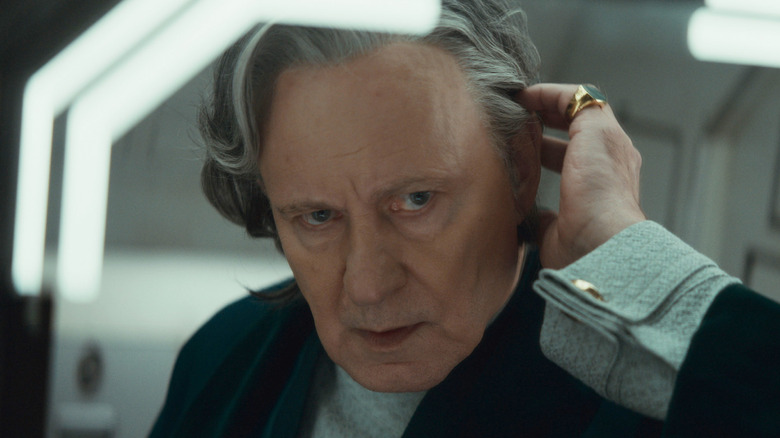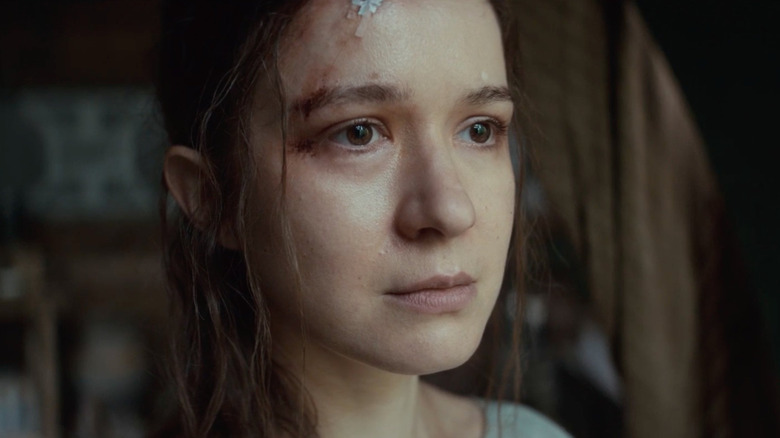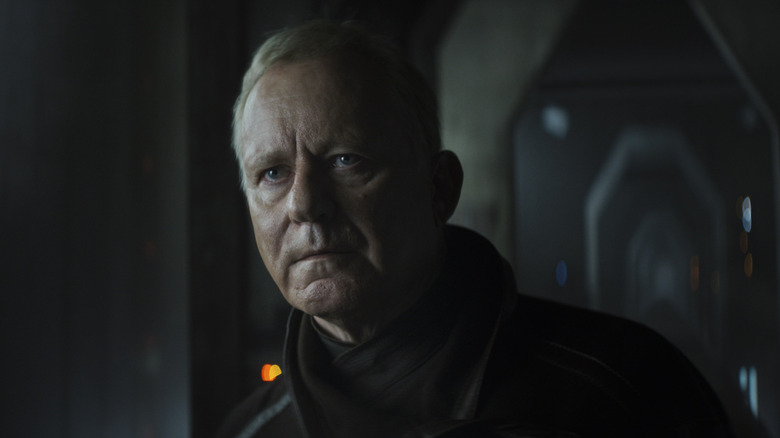Andor's Luthen Has An Even Darker Backstory Than You Probably Imagined
This article contains spoilers for "Andor."
The ending of "Andor" season 2 isn't the show's most bombastic arc, but it does provide some answers to questions we've had from the start. Despite the name of the show, Kleya Marki (Elizabeth Dulau) becomes the real protagonist of the final three episodes, which center around the arrest and death of Luthen Rael (Stellan Skarsgård) and Kleya's subsequent escape from Coruscant with the help of Cassian Andor (Diego Luna), Ruescott Melshi (Duncan Pow), and K-2SO (Alan Tudyk).
When ISB supervisor Dedra Meero (Denise Gough) finally tracks Luthen down to his antique shop, he attempts to kill himself to avoid revealing what he knows about the Rebellion. Despite his efforts, Dedra's forces are able to keep him from the brink of death by bringing him to a hospital, where he's put on life support. Knowing that Luthen's secrets — which now include knowledge of the existence of the Death Star — must be protected, Kleya sneaks into the medical facility to kill him. These scenes are intercut with a series of flashbacks showing how the two first met when Kleya was just a child.
This is where things get really dark. Many fan theories have been formulated about Luthen's true origins, from the idea that he's secretly a Jedi Master to suspicions of former Separatist allegiance. The truth, it seems, is much more grim but also more fascinating. In the flashbacks in "Andor" season 2, episode 10, "Make It Stop," we see that Luthen was a sergeant in the early Imperial military and that he was assigned to a brutal, sickening, genocidal assault on a civilian populace somewhere in the galaxy. It's on that planet where he meets Kleya, a young refugee fleeing the massacre. This chance meeting, combined with the unmitigated evil around him, is what pushes Luthen to take up the Rebel cause.
What's really going on in those Luthen and Kleya flashbacks?
The first Luthen flashback doesn't immediately signal his former imperial allegiances. There are no Stormtroopers, TIE fighters, or other recognizable pieces of the Imperial war machine. That's clearly intentional, though, as it shows just how many "normal" people were swept up in the violent crusade of Imperial conquest for one reason or another. Indeed, when we see Luthen, he's already become disillusioned with the lies of the establishment and is cowering inside a vehicle while the massacre takes place outside. He drinks and keeps repeating the phrase "Make it stop" under his breath, all while radio messages from the carnage outside pour in. ("Runners on the hill" ... "Strafe it" ... "If it's moving, kill it.")
When he finds Kleya hiding nearby, he decides to protect her. We don't know exactly when Luthen defected from the army, but the next time we see him and Kleya, they're on the run, making a scrappy living selling antiquities to local dealers — a business that eventually leads to them vending rare artifacts to Coruscant high society. We don't know the exact timeline, but it's pretty clear given Kleya's age that Luthen was an Imperial soldier during the early years of the Empire.
Later, we see how the two mismatched characters built out their complicated relationship. Kleya wants vengeance for her entire world being wiped away, and Luthen is filled with both rage and guilt, pushing him in the same direction. He brings more expertise as a former soldier, but he defers to Kleya, ensuring that the path they're heading down is one she truly wants. In the final flashback, the two sit at a restaurant on Naboo, waiting to blow an explosive charge on a nearby bridge occupied by Imperial forces. "I need to know you're making a choice," Luthen tells Kleya. "I lived most of my life without ever realizing that that was a possibility."
Luthen leaves behind a complicated Star Wars legacy
For most of "Andor," it's been unclear whether Luthen or Kleya is really calling the shots. Their complex dynamic is deftly crafted, and now we know why it's so muddled. They are a surrogate family, partners in rebellion, spies, confidants, and former enemies all at the same time. "It is not a father-daughter relationship," Elizabeth Dulau explained in an episode of "Andor Season 2 Declassified" on the "Star Wars" YouTube channel. "For it to become that, it would mean that Kleya forgives him for having done that to her family. There are parts of Kleya that really hates this man. That day is not going anywhere, it will always be between them, but love does grow around it."
Luthen's former time with the Empire adds context to the self-loathing that's been so apparent throughout the show. Perhaps the reason he's so willing to use brutal means for Rebel ends is because the moment he defected, he already believed he was unredeemable. Because he will never forgive himself, he takes on the mantle of the Rebellion's Boogeyman, doing all the nasty things he thinks are essential for victory.
In the final episode of "Andor," it's clear that the other Rebel leaders don't intend to give Luthen a shining spot in the history books. Both Cassian and Kleya speak out on his behalf, but the new brand image of the Rebel Alliance is incompatible with a man who killed so many innocents. It's a curious place to end the story of one of the most fascinating "Star Wars" characters ever written. But we know that, in the end, the sunrise Luthen once said he'd never see does come.
"Andor" is now streaming in its entirety on Disney+.


